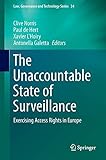The Unaccountable State of Surveillance [electronic resource] : Exercising Access Rights in Europe / edited by Clive Norris, Paul de Hert, Xavier L'Hoiry, Antonella Galetta.
Material type: TextSeries: Law, Governance and Technology Series ; 34Publisher: Cham : Springer International Publishing : Imprint: Springer, 2017Description: XII, 499 p. 22 illus. online resourceContent type: text Media type: computer Carrier type: online resourceISBN: 9783319475738Subject(s): Law | Computers | Law and legislation | Human rights | International law | Intellectual property -- Law and legislation | Law | International IT and Media Law, Intellectual Property Law | Legal Aspects of Computing | European Law | Human RightsAdditional physical formats: Printed edition:: No titleDDC classification: 343.099 LOC classification: K1401-1578.25K4240-4343Online resources: e-book Full-text access
TextSeries: Law, Governance and Technology Series ; 34Publisher: Cham : Springer International Publishing : Imprint: Springer, 2017Description: XII, 499 p. 22 illus. online resourceContent type: text Media type: computer Carrier type: online resourceISBN: 9783319475738Subject(s): Law | Computers | Law and legislation | Human rights | International law | Intellectual property -- Law and legislation | Law | International IT and Media Law, Intellectual Property Law | Legal Aspects of Computing | European Law | Human RightsAdditional physical formats: Printed edition:: No titleDDC classification: 343.099 LOC classification: K1401-1578.25K4240-4343Online resources: e-book Full-text access | Item type | Current library | Collection | Call number | Copy number | Status | Notes | Date due | Barcode |
|---|---|---|---|---|---|---|---|---|
| E-Books | MEF eKitap Kütüphanesi | Springer Nature | K4240 -4343 (Browse shelf (Opens below)) | Available | NATURE | 1420259-1001 |
Section One: 1. Comparative Legal Analysis of Informational Rights in Europe -- 2. Meta-Analysis of Exercising Access Rights in Europe -- Section Two: 3. Exercising Access Rights in Austria -- 4. Exercising Access Rights in Belgium -- 5. Exercising Access Rights in Germany -- 6. Exercising Access Rights in Hungary -- 7. Exercising Access Rights in Italy -- 8. Exercising Access Rights in Luxembourg -- 9. Exercising Access Rights in Norway -- 10. Exercising Access Rights in Slovakia -- 11. Exercising Access Rights in Spain -- 12. Exercising Access Rights in the United Kingdom -- Section Three: 13. Conclusions.
This book examines the ability of citizens across ten European countries to exercise their democratic rights to access their personal data. It presents a socio-legal research project, with the researchers acting as citizens, or data subjects, and using ethnographic data collection methods. The research presented here evidences a myriad of strategies and discourses employed by a range of public and private sector organizations as they obstruct and restrict citizens' attempts to exercise their informational rights. The book also provides an up-to-date legal analysis of legal frameworks across Europe concerning access rights and makes several policy recommendations in the area of informational rights. It provides a unique and unparalleled study of the law in action which uncovered the obstacles that citizens encounter if they try to find out what personal data public and private sector organisations collect and store about them, how they process it, and with whom they share it. These are simple questions to ask, and the right to do so is enshrined in law, but getting answers to these questions was met by a raft of strategies which effectively denied citizens their rights. The book documents in rich ethnographic detail the manner in which these discourses of denial played out in the ten countries involved, and explores in depth the implications for policy and regulatory reform.
5
